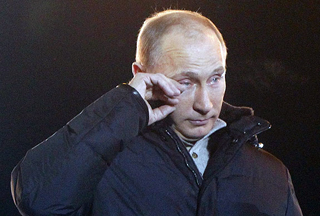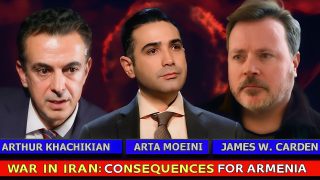Time to think

The recent processes in Ukraine, the reaction of Western powers and Russia to those processes are food for thought for every human being in any part of the world. First of all political powers and government should think well about such processes.
The negative reaction off Western powers to Russia’s actions against Ukraine’s territorial integrity, condemnation of Russia’s policy and other related processes are only the top of the iceberg. However, the only thing that is evident is the fact that the Western and democratic societies condemn the use of force, and threats thereof and want to prevent potentially more dangerous developments.
Why is the world afraid of Putin’s powerlessness?
It would be very naïve to assert that this policy of Western societies is based exclusively on values such as human freedoms, right of self-determination of nation and unacceptability of interfering with domestic affairs of a third country. In fact the Western societies are very different as every country has its political and economic interests, which have to be taken into account in relations with or against Russia. This is even proven by the fact that even one month after the bloody clampdown in Ukraine these countries cannot come to a final decision on imposing sanctions on Russia. Major players such as the US, Great Britain, Germany and France sometimes have totally different interests in relations with Russia, which is basically normal practice in international relations.
Ultimately even if there are disagreements on sanctions against Russia, all Western powers are decisive on punishing Russia for the purpose of preventing future dangerous actions by Russia. In case of sanctions against Russia many of those countries will suffer losses of billions of dollars. However, there is a limit where all countries back off. This limit is not democratic values of sovereignty of countries. This limit is the feeling of fright of Russia. They are afraid not of Russia’s territory or atomic weapons but the powerlessness of Vladimir Putin that is on the top of that strong power.
Russia is governed by one person, which is a very dangerous thing. It can be called democratic regime governed by one person, but it does not solve the problem. Decision making in Russia is totalitarian and decisions at all levels are controlled by one person. In this country that has 17 million square kilometers of land and 1480 atomic weapons all decisions are made by one person. There is no democratic decision making in Russia, which is very dangerous in consideration of the fact that decisions may be made by Putin that are out of control. This point is proven by the fact that Putin’s initiative to allow army forces be deployed on Ukraine’s territory was unanimously approved in the Russian parliament. This means that in Russia any initiatives, including decision to make new war, kill non-Russian people in the world or other insane ones can be approved in Russia.
This is what makes Russia really dangerous compared to any other country in the world. Any leader of Western countries such as the US, Great Britain or Germany can make the worst decision for the interests of their country, and even decisions that are inhumane, however those countries have opposition and mechanisms to control such decisions. Among such mechanisms are their parliaments, security agencies, etc. This means that there may be really bad decision but there cannot be unreasonably bad decisions. However, in Russia all state and other institutions are acting not to oppose to or counterbalance decisions but to serve for the implementations of decision made by one person. In this case, they even do not question the reasonability of decision. Reasonability of decisions is not generally disputed by public administration systems, however, it is becoming a factor when it concerns decisions made and enforced by one person. Individual human beings, including leaders of countries, have weaknesses or other problems that other human beings have as well, and if decisions are not well thought in a democratic way, such decision may become fatal and very dangerous for others.
The idea that the world is afraid of not Russia’s power but Putin’s powerlessness concerns the existing situation when Russia is losing its geopolitical influence, which can become a factor influencing Putin’s psychological and emotional situation and behavior. When people with such huge power fall into a situation like this or panic, they can do anything. Russia is in a similar situation now, and one can expect anything from Russia. Putin is unpredictable and can be dangerous. The most unpredictable scenario in his situation is perhaps a possibility that in case of being forced into a deadlock, instead of looking for ways out he may think “even flood after me.” Ultimately the international community is now trying to prevent that flood, which, God forbid, could also reap the humanity off the earth.
The reason of not coming to a final decision in relation to sanctions against Russia is probably not only the economic and political interests of super-states but the understanding that they should not press Putin to the wall too hard. In fact besides the conflict of interests, Western powers do not want to “wake up the monster,” which is a better truth in this case taken into consideration also the fact that Putin likes to take photos with animals.
Armenians’ last wisdom
For Armenia being isolated from external processes and politics this danger is more realistic. The authorities and a part of the opposition off Armenia are supporting the move to be under the full control of Russia through integration with the Customs Union. These groups refer to factors such as gas prices, security concerns, the conflict of Karabakh to support their opinion. Let’s imagine that all these groups are honest and fair in their decision, and there are no backstage deals or arrangements, and let’s imagine the decision to be under Russia’s influence is exclusively based on national interests.
The above and related processes in Russia show that Armenia and the entire world are dealing with Russia not as a state but a powerful system that serves for one person. Can anyone in Armenia who supports pro-Russian policy guarantee that in relation to issues concerning Armenia Putin will not act in the spirit of the historical friendship of the two nations but will make a unilateral decision affecting Armenia? Can anyone guarantee that one day an Armenian from Gyumri will not swear Russian soldiers in Gyumri, and as a result of that Putin will not apply to the Russian Duma to approve his decision to deploy armed forces in Armenia? No one can guarantee this.
In the current geopolitical situation questioning the Armenian-Russian relations and strategic partnership is similar to an unreasonable policy too. Armenia’s ally have to be the Russian society, which in fact is in trouble too as their destiny is governed by one person. As far as the Russian society has not solved its problem, for now we should at least stay away from entrusting our future to Russia, which is sinking in this phase.
In Armenia as in Russia
In fact many processes and systems in the Russian public and political life are projected in Armenia, which may be the reason why the same decision making system exists in Armenia. However, forms and contents may be different. The problem remains the same here too. In Armenia it seems there are institutes and attributes necessary for democracy such as parliament where there is opposition and civic society. In fact these systems have a cover-up function as they do not play a role in decision making. This means that democracy is not functional here. There are many examples, such as the decision to join the Customs Union, or proposed Constitutional reforms. All these and other important decisions are made only in president Serzh Sargsyan’s office.
It is very difficult to find any example to refuse this point. During the past years there have been no decisions made by Serzh Sargsyan without enforcement / implementation. Similarly, there have been no decisions that would be made in consideration of the interests of other institutes. In this case the civic society’s demonstrations in Mashtots park and against transport costs are exceptions.
Is there anyone in Armenia that can potentially have influence on decision making, may oppose to president Sargsyan, express an opinion that differs from his opinion and try to prove his/her point? If we look at the political elite of Armenia and who high ranking officials are, we will see that the answer is “no.” Most people are not brave enough to speak out, others do not think much. It is easier to live this way; life is happy and there is no pressure. Otherwise there could be financial or other implications.
Armenia does not have a tool for influencing on international relations; Armenia does not have even freedom to make its own decision and be a sovereign state. However, so far nobody has deprived Armenia of its right to think about the implications of giving its interests to the sole discretion of individuals. Even though the practice of doing anything for the purpose of reaching a goal has become dominant in Armenia, this is where we should ponder and reconsider our past. Leaving Armenia in an unpredictable hand is not a goal for which every means can be acceptable. This is not acceptable even if it brings visible political, financial and material benefits.
By Garnik Gevorgyan

























